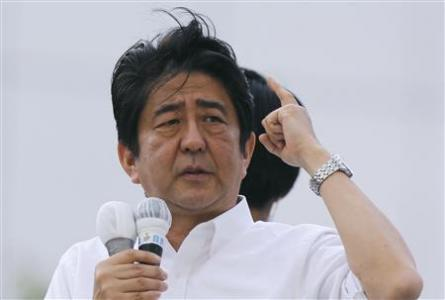Japan’s Prime Minister Shinzo Abe May Reconsider Proposed Tax Hikes; Japan’s Central Bank Governor Says Tax Hike Won’t Impact Economy

Japan’s Prime Minister Shinzo Abe may water down the first phase of the proposed sales tax hikes, slated for April 2014 and intended to balance the country’s finances, based on gross domestic product, or GDP, figures for the second quarter of 2013, Chief Cabinet Secretary Yoshihide Suga said, on Sunday, according to Kyodo News.
The proposed hikes in the national sales tax have been in the spotlight since Abe’s ruling coalition, led by Japan’s Liberal Democratic Party, won a decisive victory in an upper parliamentary house election on July 21. The tax hike is considered crucial to rein in Japan’s gross public debt, which is projected to hit 230 percent of GDP by 2014.
Abe will decide on tax hikes “after revised data are released in September on preliminary figures for April-June gross domestic product, and before a fall extraordinary Diet session,” Suga said, during a television appearance, adding that the government’s priority was to resurrect the economy by beating deflation.
Suga said administrative officials were keen on forcing the decision to raise the tax, but he may thwart such attempts, Kyodo News reported.
However, Japan’s central bank governor, Haruhiko Kuroda, on Monday, said the proposed tax hikes are unlikely to severely impact the nation’s economic growth, adding that promoting fiscal credibility is vital for economic growth.
“It is extremely important to steadily promote efforts to establish a sustainable fiscal structure to secure credibility in fiscal management,” Kuroda told a meeting in Tokyo, Kyodo News reported.
There are several scenarios under the government’s consideration to implement the sales tax hikes. They include raising it to 8 percent from the current 5 percent in April 2014 and a subsequent hike to 10 percent in October 2015, adopted by a law enacted in August 2012; a 7 percent increase in the first phase followed by an incremental increase of 1 percent in the following years; or, to raise the tax by 1 percent annually, according to Reuters.
Ryutaro Hashimoto, the Japanese prime minister who last raised the sales tax in 1997 to its current level of 5 percent from 3 percent, was forced out of office mainly after losing public support following the decision, although he had faced a host of other issues.
Abe’s predecessor Yoshihiko Noda, who pushed the legislation that mandates doubling the tax rate by 2015, also took a hit for his unpopular decision and was defeated by Abe’s party in the general elections in December 2012.
© Copyright IBTimes 2024. All rights reserved.




















